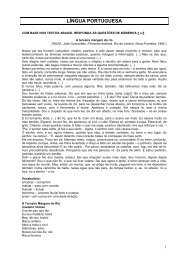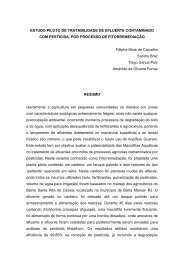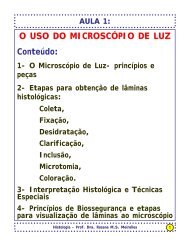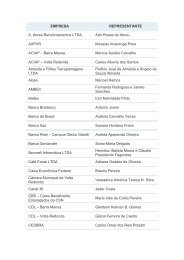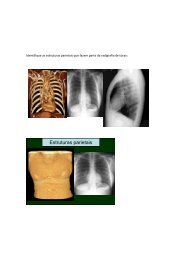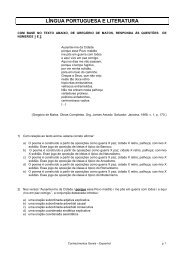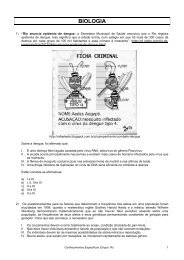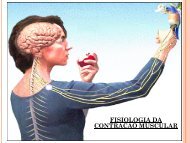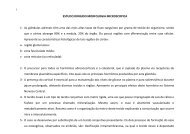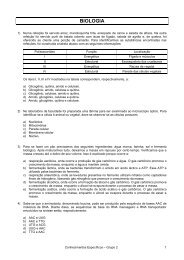PORTUGUÊS E LITERATURA BRASILEIRA - UniFOA
PORTUGUÊS E LITERATURA BRASILEIRA - UniFOA
PORTUGUÊS E LITERATURA BRASILEIRA - UniFOA
Create successful ePaper yourself
Turn your PDF publications into a flip-book with our unique Google optimized e-Paper software.
Potato chips are piling on the pounds, study finds<br />
1<br />
5<br />
10<br />
15<br />
20<br />
25<br />
30<br />
35<br />
40<br />
45<br />
INGLÊS<br />
Blame the potato chip. It's the biggest demon behind that pound-a-year weight creep that plagues<br />
many of us, a major diet study found. Bigger than soda, candy and ice cream. And the reason is partly<br />
that old advertising cliche: You can't eat just one.<br />
"They're very tasty and they have a very good texture. People generally don't take one or two chips.<br />
They have a whole bag," said obesity expert Dr. F. Xavier Pi-Sunyer of the St. Luke's-Roosevelt Hospital<br />
Center in New York.<br />
What we eat and how much of it we consume has far more impact than exercise and most other<br />
habits do on long-term weight gain, according to the study by Harvard University scientists. It's the most<br />
comprehensive look yet at the effect of individual foods and lifestyle choices like sleep time and quitting<br />
smoking.<br />
The results are in Thursday's New England Journal of Medicine.<br />
Weight problems are epidemic. Two-thirds of American adults are overweight or obese. Childhood<br />
obesity has tripled in the past three decades. Pounds often are packed on gradually over decades, and<br />
many people struggle to limit weight gain without realizing what's causing it.<br />
The new study finds food choices are key. The message: Eat more fruits, vegetables, whole grains<br />
and nuts. Cut back on potatoes, red meat, sweets and soda.<br />
"There is no magic bullet for weight control," said one study leader, Dr. Frank Hu. "Diet and exercise<br />
are important for preventing weight gain, but diet clearly plays a bigger role."<br />
Doctors analyzed changes in diet and lifestyle habits of 120,877 people from three long-running<br />
medical studies. All were health professionals and not obese at the start. Their weight was measured<br />
every four years for up to two decades, and they detailed their diet on questionnaires.<br />
On average, participants gained nearly 17 pounds over the 20-year period.<br />
For each four-year period, food choices contributed nearly 4 pounds. Exercise, for those who did it,<br />
cut less than 2 pounds.<br />
Potato chips were the biggest dietary offender. Each daily serving containing 1 ounce (about 15<br />
chips and 160 calories) led to a 1.69-pound uptick over four years. That's compared to sweets and<br />
desserts, which added 0.41 pound.<br />
For starchy potatoes other than chips, the gain was 1.28 pounds. Within the spud group, french fries<br />
were worse for the waist than boiled, baked or mashed potatoes. That's because a serving of large fries<br />
contains between 500 to 600 calories compared with a serving of a large baked potato at 280 calories.<br />
Soda added a pound over four years. Eating more fruits and vegetables and other unprocessed<br />
foods led to less weight gain, probably because they are fiber-rich and make people feel fuller.<br />
For each four-year period, these factors had these effects on weight:<br />
_ An alcoholic drink a day, 0.41-pound increase.<br />
_ Watching an hour of TV a day, 0.31-pound increase.<br />
_ Recently quitting smoking, 5-pound increase.<br />
People who slept more or less than six to eight hours a night gained more weight.<br />
The study was funded by the National Institutes of Health and a foundation. Several researchers<br />
reported receiving fees from drug and nutrition companies.<br />
"Humans naturally like fat and sweet," said Dr. David Heber, director of the UCLA Center for Human<br />
Nutrition, who had no role in the study. "That's why we always tell people to eat their fruits and<br />
vegetables."<br />
Pi-Sunyer, who also wasn't involved in the research, said the study gives useful advice.<br />
"It's hard to lose weight once you gain it," he said. "Anything that will give people a clue about what<br />
might prevent weight gain if they follow through with it is helpful."<br />
The federal government earlier this year issued new dietary guidelines advising people to eat<br />
smarter. This month, it ditched the food pyramid — the longtime symbol of healthy eating — in favor of a<br />
dinner plate divided into four sections containing fruits, vegetables, protein and grains.<br />
Story by Alicia Change, AP Science Writer from San Francisco Chronicle:<br />
http://www.sfgate.com<br />
Published: June 22, 2011<br />
Conhecimentos Gerais – Inglês Pag. 12





